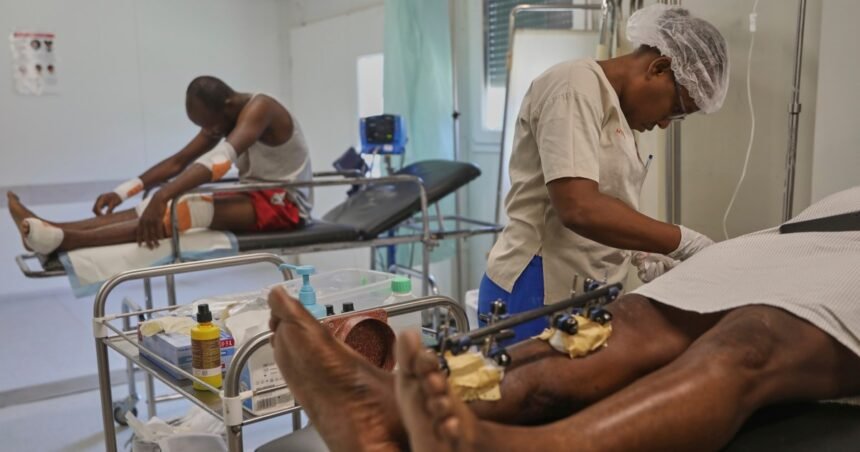Probably the most peaceable space in the whole hospital was a small patio at its centre, the place sufferers rested on benches beneath a picket pagoda. Close by, a small, vibrant impediment course helped survivors regain their mobility after surgical procedure and different intensive remedies.
That is the place we met four-year-old Alexandro and his mom, Youseline Philisma.
Alexandro was only one month outdated when an armed group set fireplace to the displaced individuals camp the place they had been residing. He was plucked from the flames, alive however severely burned.
Since then, Youseline had been taking him to Tabarre’s burn unit — the one one left within the nation.
“Once I come to the hospital, it’s one other world. Everyone understands my infant. Everybody provides us lots of love,” she instructed us.
Alexandro will want the burn unit’s look after the remainder of his life. Surgeon Donald Jacques Extreme is among the many medical doctors treating him.
Extreme might go away the nation. His spouse and kids have already completed so, departing 4 years in the past for america. Armed fighters had overrun their dwelling. Extreme himself has a visa to reside in Canada. However to date, he has not left.
His fellow surgeon, Xavier Kernizan, tried to clarify the sense of obligation he and Extreme share.
“We all know that if we’re not right here, somebody will battle,” Kernizan mentioned.
“Personally, we’re near burnout. Typically we’re near despair. However there’s additionally this satisfying feeling of getting helped to enhance somebody’s day by day life, of providing somewhat hope to somebody of their darkest moments.”
But when the safety scenario continues to deteriorate, it’s inconceivable to know whether or not Tabarre Hospital will survive.
On April 11, my documentary group and I drove out of the hospital gates for the primary time in every week. We had been heading to Petion-Ville, one of many few locations in Port-au-Prince nonetheless underneath authorities management.
There, we walked throughout a soccer pitch close to the Karibe Resort, the place a helicopter from the World Meals Programme picks up passengers. It’s the one manner out of the capital proper now.
We clambered into the helicopter, its rotors started their churn, and the Haitian capital started to develop smaller as we rose into the air, crusing above the bubble of violence under. I keep in mind feeling reduction.
The employees on the hospital stayed behind. They haven’t any intention of leaving.
